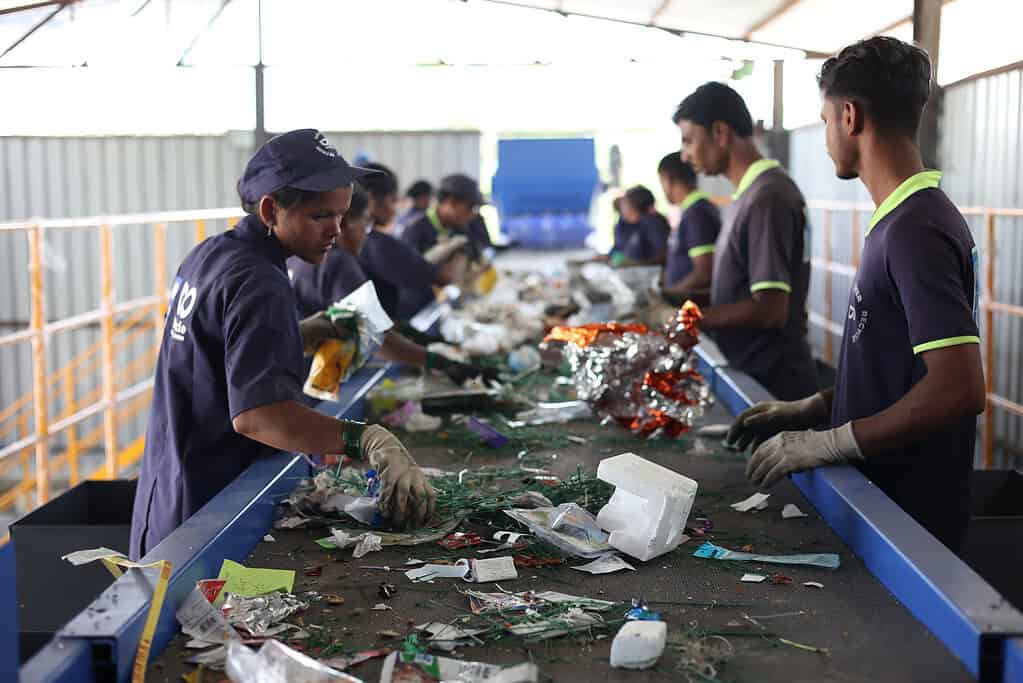ReCircle taps the hidden potential of waste — and waste workers — in India
Under the Green Growth Initiative, Acumen has invested in a company that’s transforming India’s plastic waste industry for the betterment of people and planet.
- Blog
- Dignified jobs
- India

Every day millions of people in India pick through refuse in search of salvageable scraps and recyclables. Known as Safai Saathis, they play a vital role in the country’s waste management system, yet their work status is informal, their pay grade is low, and their output is ultimately insufficient: Despite generating more plastic waste than most economies in the world, India has to import plastic waste from other countries to feed its domestic recycling industry due to inadequate waste retrieval.
ReCircle is on a mission to change that. The new Acumen investee is harnessing digital technology to build an ethical and traceable reverse supply chain for plastic in India. Through a combination of partnerships, networking, apps, dashboards, and data analytics, ReCircle aims to turn a shadow supply chain into a formal, well-functioning, and transparent system, empowering marginalized workers in the process.
The company starts by partnering with Safai Saathis at its material recovery facility. It onboards them to ensure they collect the right types of material in the right quantity. Separately, ReCircle connects various collection facilities in its network with either authorized recyclers for high-value plastics or with cement plants or waste-to-energy plants for low-value plastics.
The whole time, ReCircle tracks every truckload, every invoice, every kilogram of salvaged waste as it moves through the supply chain and provides all of this data to global brands. The brands, in turn, can purchase plastic credits to offset their plastic footprints in compliance with India’s Extended Producer Responsibility (EPR) rules. ReCircle uses the money from the credits to incentivize the recyclers, collection facilities, and Safai Saathis.
“Safai Saathis are the backbone of our waste management system,” says Gurashish Sahni, co-founder and COO of ReCircle. “They deserve to work safely and get paid fairly. Our inclusive business model shows how environmental sustainability and social progress can go hand in hand.”
A technology-centered approach
Since launching in 2016 by co-founders Rahul Nainani and Gurashish Sahni, ReCircle has helped divert more than 169,000 metric tons of waste from landfills and oceans through its network of collection facilities. That’s the equivalent of about 28,166 adult elephants.
Its network has grown to encompass 271 cities, one self-owned material recovery facility, 45 processing partners who in turn work with 400 waste collection facilities across India. It has partnered with 32 global brands, including Hindustan Coca-Cola Beverages, Nestle, and Mondelez International, and more than 3,100 Safai Saathis across its partner collection facilities.
Initially, it tracked data through laborious offline documentation and paperwork. In partnering with marginalized workers and a loose array of collection facilities, pen and paper was the most realistic starting point. But ReCircle recognized that if it wanted to revolutionize India’s waste supply chain at scale, a technology-centered approach was essential.
Enter the company’s new clean tech platform, ClimaOne, which digitizes the whole process. Waste collection facilities can connect with key players in the supply chain, facilitate pickup requests, and receive digital payments. Processors can track vehicles, manage inventory, keep detailed records, and perform certification validation. Global brands can buy and trace plastic credits and integrate their work directly into compliance dashboards.
ReCircle is using the proceeds of the round where Acumen participated to test its ClimaOne platform and propel the company into new waste supply chains such as paper, textile, and glass.
Why Acumen invested
At Acumen, we view workforce development as one of the keys to breaking the cycle of poverty. The simple fact is, decent jobs with formal employers and basic benefits open up a world of possibilities for people living in poverty.
That’s why we’re investing to upskill the next generation of workers in Latin America, build an inclusive job market in West Africa, and kickstart a green jobs revolution in India, where the overwhelming majority of the workforce toils in poor working conditions without formal benefits, contracts, or guaranteed wages.
ReCircle first came to our attention when they participated in our Green Growth Accelerator through the Acumen Academy, with support from the Target Foundation. The scale of their ambition and the innovativeness of their clean tech platform impressed us, as did their conviction that Safai Saathis don’t need to be replaced or displaced: They need to be empowered and integrated into a formal, sustainable business model.
In addition to our financial investment, we plan to support ReCircle with our expertise and global network, as we do with all our investees. We’ve already nominated them to join the Dignified Jobs Collaborative by Upaya Social Ventures and have opened up opportunities with the Clinton Global Initiative and the Impact Investors’ Council in India.
“Acumen is excited to support ReCircle’s vision of transforming waste into a valuable resource and bringing dignity to the work of people in India’s waste management value chain, who are often overlooked,” says Paraag Sabhlok, Associate Director of Acumen’s India Portfolio. “We look forward to being part of their vision for an inclusive and ethical circular model in the plastic waste value chain.”
Image courtesy of ReCircle